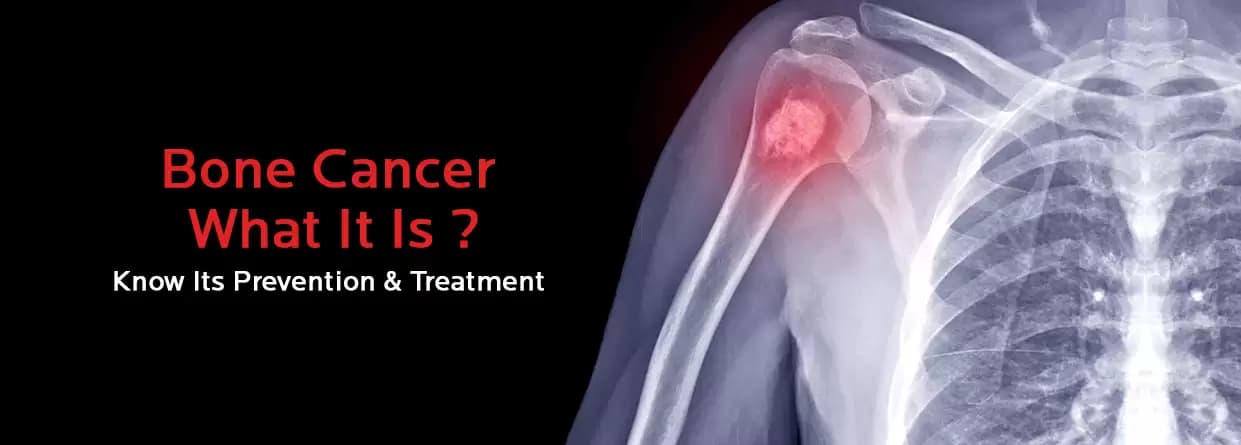
In the sphere of medical challenges, few foes are as inscrutable and intimidating as cancer. Bone cancer evolves as a specifically silent and sneaky invader among other types of cancer.
In the sphere of medical challenges, few foes are as inscrutable and intimidating as cancer. Bone cancer evolves as a specifically silent and sneaky invader among other types of cancer. Bone cancer is among the rare conditions arising from the cells within or around the cells. When an individual is suffering from bone cancer, the cells begin to increase and aggressively keep multiplying until the entire bone is disrupted. Further, these cancer cells start to spread all over the body through blood circulation affecting multiple organs such as tissues, bones, or lungs.
It is important to gain information on bone cancer and its symptoms so that treatment can be considered on time. In this blog, our main aim is to create awareness about this disease, its causes, symptoms, diagnosis, and treatment options. However, kindly note that the information provided in this blog is entirely based on research and in-depth analysis. You should book your appointment with the best oncologist in Kolkata at the Calcutta Medical Research Institute, one of the best multispecialty hospitals. They have the best and most experienced healthcare professionals who ensure proper diagnosis and treatment.
Bone cancer is a condition that happens when there is a growth or formation of a tumor or a typical mass of tissue in the bone which is referred to as bone sarcomas. A tumor can be benign which indicates that it is developing fast and spreading to other body parts. A benign tumor is called cancerous. Bone cancer can occur in any part of the body, however, it mostly begins in the pelvic bone or long bones in the legs, arms, femur, or shinbone. Cancer that starts in the bones is not common but can be aggressive, hence early diagnosis is very important.
There are several bone cancer types which include:
Bone cancer stages are identified by their location and size, even if it hasn’t spread to other areas in the body. There are four bone stages which include:
Not every type of bone cancer causes pain, however, pain is one of the common bone cancer symptoms. Getting in touch with a doctor is recommended to identify the symptoms and what is causing them. Make sure to keep a note of the following symptoms:
Bone cancer causes are not known yet, however, some factors lead to enhancing the chances of atypical growth formation in the bone. Here are some of the causes:
Bone cancer diagnosis will involve certain tests and the doctor will gain information about your symptoms and medical history. The doctor will view images of your bones by ordering imaging tests like:
Your oncology doctor will recommend certain options for bone cancer treatment. You need to note that the treatment depends on its location, stage, grade, age, overall health, and size. Here are some of the bone cancer treatment options:
Being diagnosed with any type of cancer can bring a lot of emotions like frustration, anxiety, irritation, fear, and uncertainty. Bone cancer is one of the types of cancer, but it is rare. There are various treatment options available and can be treated efficiently. If you are diagnosed with bone cancer, make sure to get in touch with The Calcutta Medical Research Institute in Kolkata to understand your treatment options. You can consider joining a support group as a conversation with people experiencing similar emotions can help you feel better mentally, and emotionally, and will improve your spiritual health.
Yes, bone cancer is curable if it hasn’t spread to other bones in the body.
Yes, bone cancer is painful and often begins with a feeling of tenderness.
Written and Verified by:

Dr. Chanchal Goswami is a Consultant in Oncology at CMRI Hospital, Kolkata with over 36 years of experience. He specializes in breast, thoracic, head & neck, and genitourinary cancers, with expertise in both radiation and radiotherapy care.
Similar Oncology Blogs
Book Your Appointment TODAY
© 2024 CMRI Kolkata. All Rights Reserved.